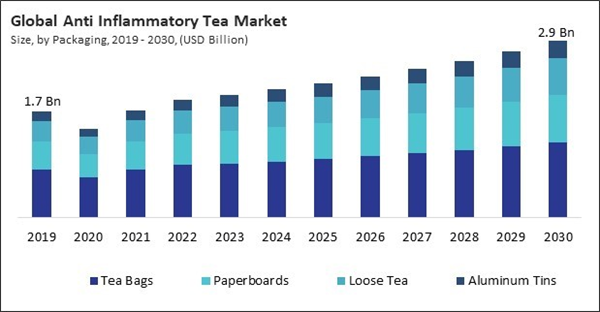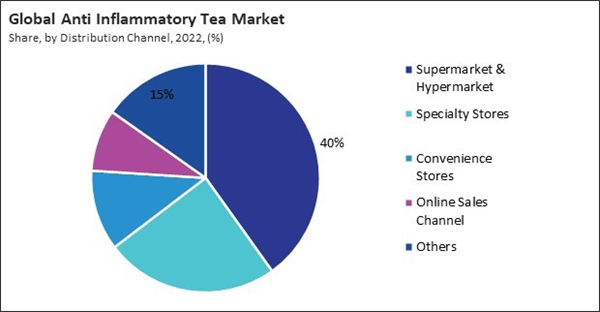Specialty stores frequently have dedicated staff members who are passionate about health and wellness and possess expertise in the benefits of this. Thus, Specialty stores segment captured 24.5% revenue share in market 2022.They can provide personalized recommendations, expert advice, and detailed information about different tea varieties, ingredients, and brewing techniques, enhancing the shopping experience for consumers seeking specific health benefits or flavor profiles.
E-commerce platforms provide consumers convenient access to a wide range of products, regardless of geographical location. Consumers can browse, compare, and buy products online from their residences, eliminating the necessity of visiting brick-and-mortar stores. In addition, e-commerce platforms are accessible around the clock, enabling consumers to purchase anti-inflammatory teas at their convenience.
Additionally, based on data from the National Library of Medicine, the estimated number of individuals with diabetes in India in 2019 was 77 million. This figure is projected to surpass 134 million by 2045. It is projected that approximately 592 million individuals will perish from diabetes by 2035. Similarly, according to the Government of the UK, from 2021 to 2022, 63.8% of adults aged 18 years and over in England were estimated to be overweight or living with obesity. This was an increase from 2020 to 2021 (63.3%).
However, Pharmaceutical drugs are often perceived as more potent and efficacious compared to herbal remedies like this. Consumers may believe that pharmaceutical medications provide faster relief and more predictable outcomes for managing inflammation, leading to a preference for conventional drugs over natural remedies. In addition, inflammatory conditions such as arthritis, rheumatism, and inflammatory bowel disease are increasingly medicalized, with healthcare providers prescribing pharmaceutical interventions as the primary treatment approach. Hence, increasing competition from pharmaceutical companies is hindering the market’s growth.
By Packaging Analysis
On the basis of packaging, the market is segmented into loose tea, paperboards, aluminum tins, and tea bags. The tea bags segment recorded 44.5% revenue share in the market in 2022. Tea bags simplify the brewing process, making them accessible to consumers of all skill levels, including those who may not be familiar with loose-leaf teas or traditional brewing methods.By Distribution Channel Analysis
By distribution channel, the market is divided into supermarket & hypermarket, specialty stores, convenience stores, online sales channel, and others. In 2022, the convenience stores segment generated 11.4% revenue share in the market. Convenience stores cater to consumers with busy, on-the-go lifestyles who seek quick and easy solutions for their health and wellness needs.By Type Analysis
Based on type, the market is bifurcated into turmeric, ginger, green tea, black tea, chamomile, peppermint, lemongrass, and cinnamon. In 2022, the ginger segment attained 11.6% revenue share in the market. Ginger comprises bioactive compounds like gingerol, known for their strong anti-inflammatory properties.By Regional Analysis
Region-wise, the market is analyzed across North America, Europe, Asia Pacific, and LAMEA. The Europe region captured a 30.4% revenue share in the market in 2022. Europe has a growing awareness and emphasis on health and wellness.List of Key Companies Profiled
- The Hain Celestial Group, Inc.
- Tata Consumer Products Limited (Tata Group)
- Dilmah Ceylon Tea Company PLC (Dilmah)
- Bigelow Tea
- Mountain Rose Herbs
- Terra Teas Organic
- Full Leaf Tea Company
- Davidson's Organic Teas
- ArtfulTea
- Yogi Tea GmbH
Market Report Segmentation
By Packaging (Volume, Tonnes, USD Billion, 2019-2030)- Tea Bags
- Paperboards
- Loose Tea
- Aluminium Tins
- Supermarket & Hypermarket
- Specialty Stores
- Convenience Stores
- Online Sales Channel
- Others
- Black Tea
- Green Tea
- Ginger
- Cinnamon
- Turmeric
- Chamomile
- Peppermint
- Lemongrass
- North America
- US
- Canada
- Mexico
- Rest of North America
- Europe
- Germany
- UK
- France
- Russia
- Spain
- Italy
- Rest of Europe
- Asia Pacific
- China
- Japan
- India
- South Korea
- Australia
- Malaysia
- Rest of Asia Pacific
- LAMEA
- Brazil
- Argentina
- UAE
- Saudi Arabia
- South Africa
- Nigeria
- Rest of LAMEA
Table of Contents
Companies Mentioned
- The Hain Celestial Group, Inc.
- Tata Consumer Products Limited (Tata Group)
- Dilmah Ceylon Tea Company PLC (Dilmah)
- Bigelow Tea
- Mountain Rose Herbs
- Terra Teas Organic
- Full Leaf Tea Company
- Davidson's Organic Teas
- ArtfulTea
- Yogi Tea GmbH










